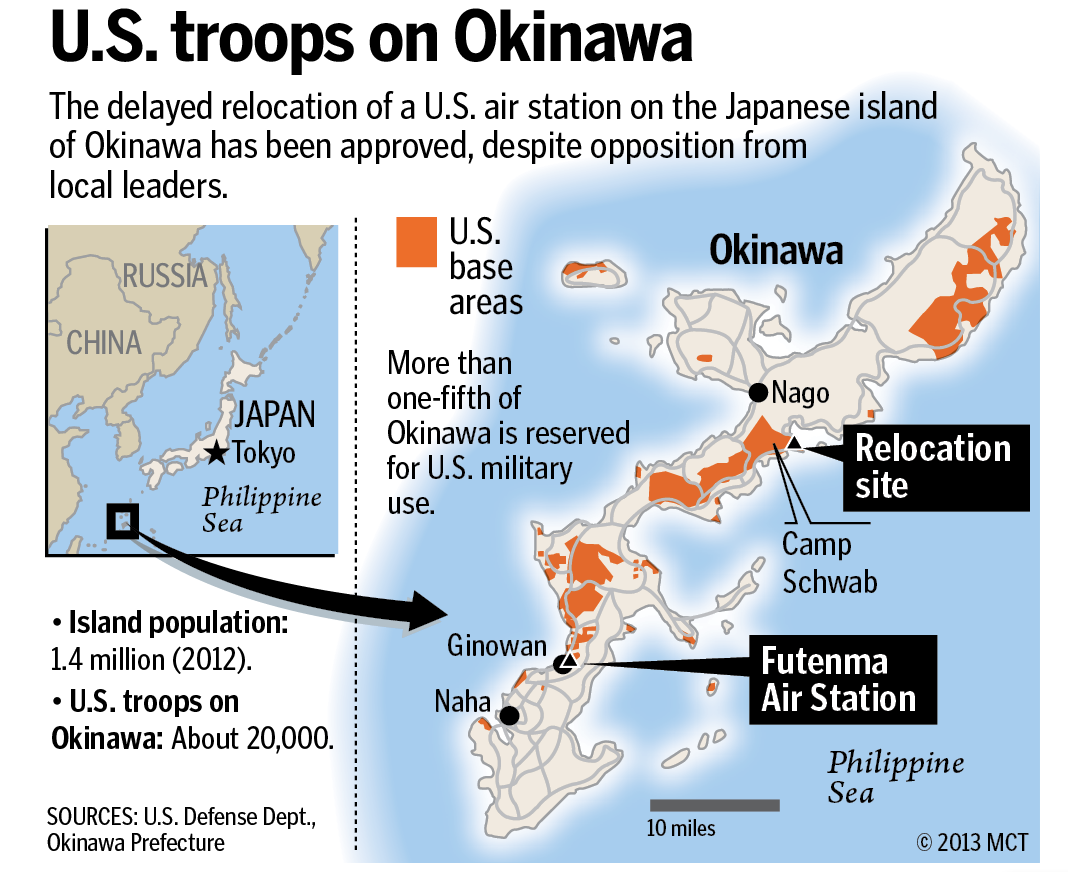TOKYO — Permission from a Japanese governor to begin work on a new U.S. military base in Okinawa is a “milestone” in Washington’s new emphasis on the Asia-Pacific region, U.S. Defense Secretary Chuck Hagel said Friday.
Okinawa Gov. Hirokazu Nakaima gave the green light Friday for landfill work at the location of a new U.S. military base despite fierce local opposition. However, he repeated his own commitment to ridding the island of the base altogether.
Camp Schwab-Henoko Bay is to replace U.S. Marine Corps Air Station Futenma. In Naha, the capital of Okinawa, about 2,000 people formed a human chain around the prefecture office building to protest the governor’s decision.
The United States and Japan agreed in 1996 to close Futenma and move its operations to a new base at Nago city, but opposition from locals and environmental groups has prevented construction in the environmentally sensitive area.
Hagel said the new base would be “a critical part of the realignment of U.S. forces on Okinawa.” He said the permit approval was the “most significant milestone” so far in long-running efforts to reduce the impact of the U.S. military presence on Okinawans.
“The realignment effort is absolutely critical to the United States’ ongoing rebalance to the Asia-Pacific region and our ability to maintain a geographically distributed, operationally resilient, and politically sustainable force posture in the region,” Hagel said.
President Barack Obama has touted a shift in U.S. political, military and trade priorities toward Asia, with its fast-growing economies and China as a rising, potential rival superpower.
“Our alliance has helped underwrite regional peace, stability, and prosperity for more than half a century,” said Hagel, without mentioning China.
Nakaima denied that a boost in public money from Tokyo for the prefecture would be linked to its support for the new base. Prime Minister Shinzo Abe has promised economic stimulus to Okinawa worth about $2.9 billion every year through 2021.
Announcing his authorization for work to start, the governor told reporters, “I have not changed my pledge” to move the base off the island, a position he has held for three years.
When a reporter pointed to the apparent contradiction, he responded that the priority was to close the current site, located near residential areas.
“What’s important here is to move the dangerous air base out of the city as soon as possible,” he said.
Washington and Tokyo believed it would take nearly 10 years to build the new base, he said: “But I believe it will take longer.”
Hagel noted that some Marines are being relocated to Guam and other Pacific bases.
“Moving forward with this plan will reduce our footprint in the most populated part of Okinawa and let us return significant land south of Kadena Air Base, while sustaining U.S. military capabilities vital to the peace and security of the region,” he said.
Experts pointed out that Friday’s decision does not actually start construction.
“I don’t believe the base will be built, because of massive opposition in Okinawa,” said political science professor Akikazu Hashimoto, an expert on U.S.-Japanese relations at JF Oberlin University.
Relations between locals and the base’s 18,000 personnel are tense. The 1995 kidnapping and rape of a 12-year-old schoolgirl by two U.S. Marines and a Navy sailor inflamed residents’ resentment.
Nakaima, a former bureaucrat, at first supported the plan for a relocation away from the town, but then called for the base to be moved off Okinawa in an about-face that helped him get re-elected in 2010.
After the end of the occupation of Japan in 1952, Okinawa remained under U.S. military control until 1972. The U.S. military used the island as a base during the Korean and Vietnam wars.
In Ginowan, site of the current Futenma base, resident Shinji Gima was quoted by the Kyodo News agency as saying he and others were “fearful” of accidents and crimes by U.S. military personnel, but that he could not welcome the relocation of the facility to Nago.
“The base will just be moved from one place to another within Okinawa,” he said.



